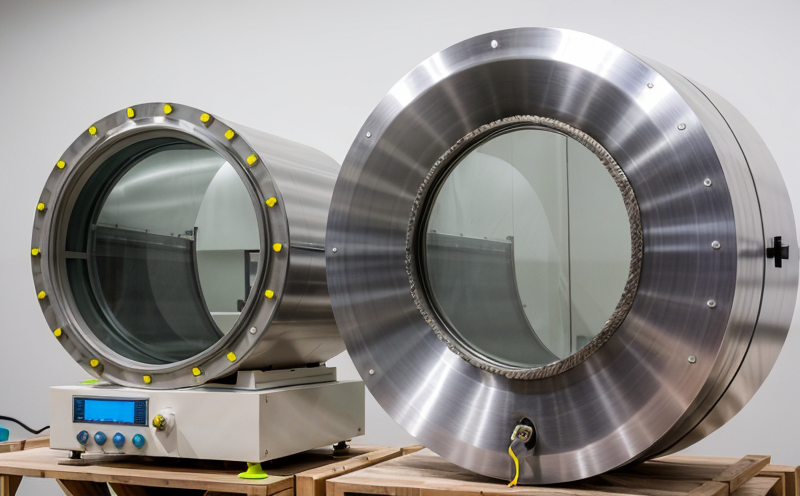ASTM C1836 Thermal Stability of Shielding Materials
The ASTM C1836 standard test method is designed to evaluate the thermal stability of radiation shielding materials. This critical testing ensures that materials used in applications requiring high levels of radiation protection, such as nuclear reactors and medical facilities, maintain their integrity under extreme temperature conditions.
Thermal stability is a crucial property for materials that are subjected to prolonged exposure to heat during use. In the context of radiation shielding, thermal stability ensures that the material does not degrade or lose its protective properties over time. This can be particularly important in environments where high temperatures might cause the material to expand, contract, or even decompose.
The ASTM C1836 test method involves subjecting a specimen of the radiation shielding material to a controlled temperature environment for an extended period. The specimen is then evaluated for any changes in its physical properties, such as mass loss, color change, or structural integrity. This testing helps manufacturers and users ensure that the materials they select meet the required standards for safety and reliability.
The test method is particularly important for materials used in nuclear reactors, where high temperatures are a constant factor of concern. In medical applications, such as radiation therapy equipment, the thermal stability of shielding materials ensures that the protective barrier remains intact even under the heat generated during treatment sessions. The standard also applies to other sectors like space exploration and defense, where extreme environmental conditions may affect material performance.
| Application | Materials Tested |
|---|---|
| Nuclear Reactors | Beryllium, Lead, Concrete |
| Medical Facilities | Rubber-based compounds, Plastic alloys |
| Space Exploration | Titanium alloys, Composites |
| National Defense Systems | Beryllium copper, Aluminum-based alloys |
- Ensures compliance with international standards like ISO and ASTM.
- Provides a method for quantifying the thermal stability of radiation shielding materials.
- Serves as a benchmark for quality control in material production.
- Aids in the development of new materials that meet stringent safety requirements.
Scope and Methodology
The ASTM C1836 test method is designed to evaluate the thermal stability of radiation shielding materials by subjecting them to controlled temperature conditions over a specified period. The primary goal is to assess how well these materials maintain their structural integrity and protective properties under high-temperature exposure.
During testing, a specimen of the material in question is placed in an oven or similar apparatus that can control temperature precisely. The test typically involves heating the specimen to a specific temperature for a set duration, followed by a period at room temperature to allow any changes to stabilize.
The specimen is then carefully examined and compared to a reference sample not exposed to high temperatures. Changes in physical properties are recorded and evaluated against predetermined acceptance criteria. These criteria can include mass loss, color change, structural deformation, or other relevant parameters specific to the material type.
Testing laboratories must adhere strictly to ASTM C1836 guidelines to ensure consistent results that accurately reflect the thermal stability of the materials under examination. This includes using calibrated equipment and following standard operating procedures to minimize variability in test outcomes.
The methodology is particularly important for ensuring that materials used in critical applications, such as nuclear reactors and medical facilities, do not degrade over time due to exposure to high temperatures. By adhering to ASTM C1836 standards, laboratories can provide reliable data that helps manufacturers and users make informed decisions about material selection.
Industry Applications
| Industry | Purpose of ASTM C1836 Testing |
|---|---|
| Nuclear Power Generation | Evaluating materials used in reactor containment structures. |
| Medical Technology | Ensuring the integrity of radiation shielding in medical devices. |
| Aerospace and Defense | Assessing materials used in spacecraft and military equipment. |
| Research Institutions | Supporting the development of new radiation shielding technologies. |
- Ensures compliance with international standards like ISO and ASTM.
- Provides a method for quantifying the thermal stability of radiation shielding materials.
- Serves as a benchmark for quality control in material production.
- Aids in the development of new materials that meet stringent safety requirements.
Eurolab Advantages
At Eurolab, we pride ourselves on offering comprehensive testing services tailored to meet the highest standards set by international bodies like ASTM. Our team of experts ensures that every test conducted adheres strictly to ASTM C1836 guidelines, providing accurate and reliable results.
We offer a range of additional services designed to support our customers in their quality management and compliance efforts. These include:
- Customized testing protocols for unique materials or applications.
- Training sessions for personnel involved in material selection and testing.
- Comprehensive reporting and analysis of test results, including recommendations for improvement where necessary.
- Support with regulatory compliance and certification processes.





